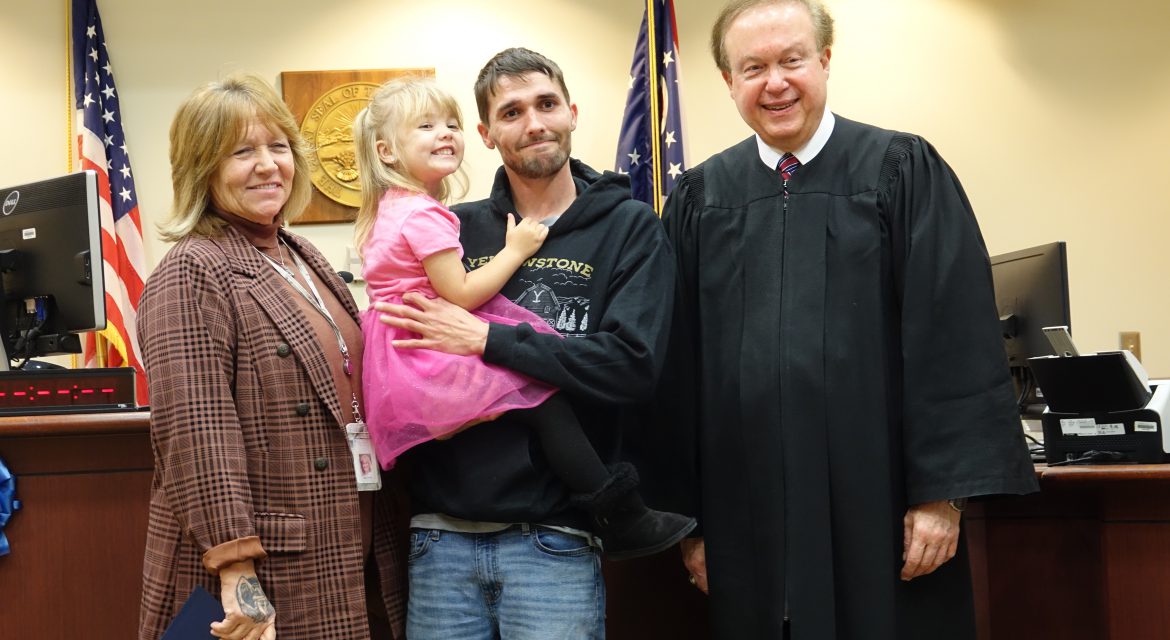
BATAVIA, OH (Nov. 13, 2023) — Adam Hurst started the Clermont County Family Recovery Court program on Dec. 8, 2022, after losing his children due to substance use. Hurst was tired of blaming others for his problems and needed a change.
“Adam entered treatment and worked very hard to overcome his barriers,” said Judge James A. Shriver at the Family Recovery Court’s 15th Commencement Ceremony on Nov. 9. “He got a job, found stable housing, got his license, then a car, and reunified with his children in April. Today we celebrate over 337 days of sobriety and all of Adam’s accomplishments.”
The specialized docket under Judge Shriver was one of the first of its kind in southwestern Ohio when it started on Nov. 13, 2014. Clermont County Family Recovery Court was based on the drug court model, which emphasizes treatment over punishment.
On average, the program takes more than a year to complete. Families (couples or individuals) voluntarily enter Family Recovery Court. Requirements include attending frequent court hearings, Substance Use Disorder treatment, random and frequent drug screens, meetings with a case manager, calling and checking in regularly, attending AA or similar sober support meetings and getting a sponsor or mentor, having income, establishing housing, taking care of criminal matters and getting a driver’s license.
Hurst said during the ceremony that he started using marijuana at age 7 or 8, progressed to alcohol by age 11, and then to methamphetamine. His lifestyle led to loss of family relationships, joblessness, homelessness and jail time. He lost his children to Children’s Protective Services. He was in six treatment programs before entering Family Recovery Court.
“It is better than any of the other ones I’ve ever done,” he said. “It was worth it.”
Sally Partin, a Certified Peer Recovery Support Coach and Chemical Dependency Counselor Assistant with the Clermont Recovery Center, was guest speaker. Partin works with all of the families in the Family Recovery Court program.
“Sally is an essential part of the Family Recovery Court because she helps each participant identify their strengths to help them build courage and the recovery community they need to stay sober,” Judge Shriver said. “Thank you Sally for sharing your story today, and why you believe sober support and sponsorship is so important to recovery.”
BATAVIA, OH (Nov. 9, 2022) — The Family Recovery Court of the Clermont County Juvenile Court has earned final certification from the Ohio Supreme Court’s Commission on Specialized Dockets.
In order to receive the certification, the local court had to submit an application, undergo a site visit, and provide specific program materials in response to certification standards that went into effect in January 2014.
Ohio Supreme Court Chief Justice Maureen O’Connor congratulated the Clermont County Juvenile Court and Judge James A. Shriver for receiving final certification.
“Specialized dockets divert offenders toward criminal justice initiatives that employ tools and tailored services to treat and rehabilitate the offender so they can become productive members of society,” said Ohio Supreme Court Chief Justice Maureen O’Connor. “Studies have shown this approach works by reducing recidivism while saving tax dollars.”
Specialized dockets are courts that are dedicated to specific types of offenses or offenders and use a combination of different techniques for holding offenders accountable while also addressing the underlying causes of their behavior. There are more than 210 specialized dockets in Ohio courts that deal with issues such as:
The standards provide a minimum level of uniform practices for specialized dockets throughout Ohio, and allow local courts to innovate and tailor to meet their community’s needs and resources.
Currently, 71% of Specialized Docket participants admitted to methamphetamine use while the other 29% indicated fentanyl was their substance of choice. According to Judge Shriver, the Clermont County Family Recovery Court has implemented evidence-based practices and worked together with a number of partner agencies to assist families in overcoming the barriers in their lives and achieving long-term sobriety and changing their way of life. Participants have been able to obtain safe and sustainable employment and housing before graduation and learn what it means to have a sober and loving family relationship with their children.
The certification requirements include establishing eligibility requirements, evaluating the effectiveness of the specialized docket, and assembling a treatment team for implementing daily operations of the specialized docket. The team can include licensed treatment providers, law enforcement, and court personnel, and is headed by the specialized docket judge.
The Commission on Specialized Dockets has 22 members who advise the Supreme Court and its staff regarding the promotion of statewide rules and uniform standards concerning specialized dockets in Ohio courts; the development and delivery of specialized docket services to Ohio courts; and the creation of training programs for judges and court personnel. The commission makes all decisions regarding final certification.
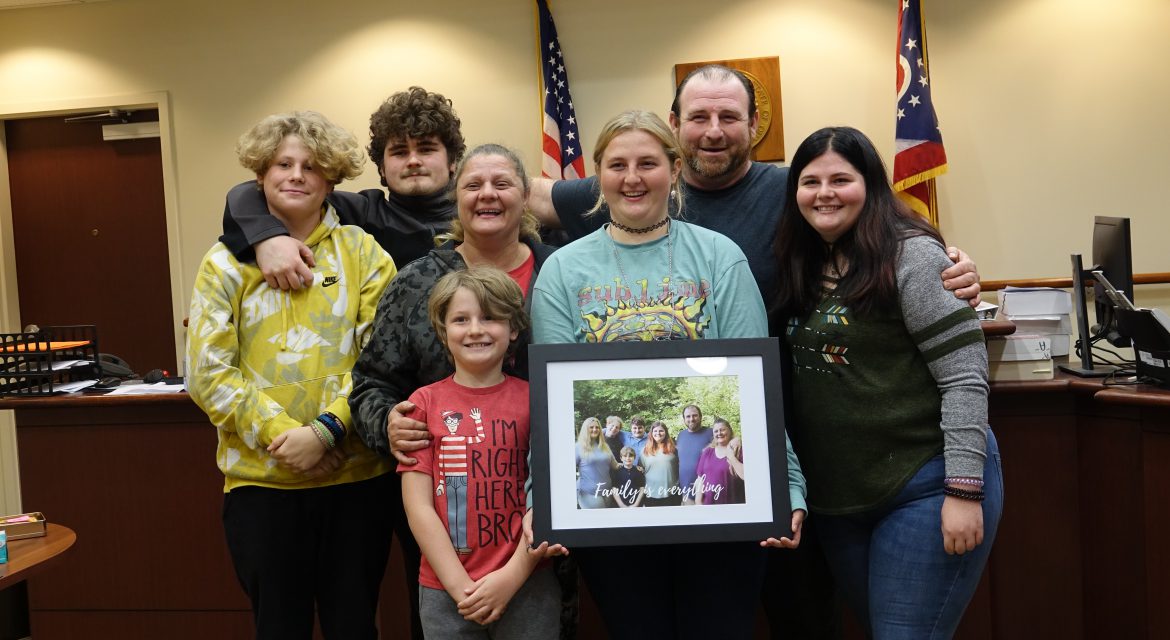
BATAVIA, OH – Billie and Dwayne Richards were on the verge of homelessness, without reliable transportation and unemployed. They had lost custody of their five children. They were using methamphetamine.
After 17 months in the Clermont County Family Recovery Court, the situation changed completely for the married couple of 22 years and their kids, ages 19, 18, 16, 13, and 8.
“Billie and Dwayne have overcome some of the most challenging barriers in their road to recovery,” said Judge James Shriver at the Richards’ graduation from the program on Oct. 13. “They both completed substance use disorder treatment, obtained stable housing, have reliable transportation, gained full-time employment, and their children have been home for over 100 days now.
“Billie and Dwayne both have over one year of sobriety and each of them has provided over 130 negative tox screens.”
The specialized docket under Judge Shriver was one of the first of its kind in southwestern Ohio when it started on Nov. 13, 2014. Clermont County Family Recovery Court was based on the drug court model, which emphasizes treatment over punishment.
On average, the program takes more than a year to complete. Families (couples or individuals) voluntarily enter Family Recovery Court. Requirements include attending frequent court hearings, Substance Use Disorder treatment, random and frequent drug screens, meetings with a case manager, calling and checking in regularly, attending AA or similar sober support meetings and getting a sponsor or mentor, having income, establishing housing, taking care of criminal matters and getting a driver’s license.
Sharon Gillespie of Child Focus praised Billie and Dwayne for their resilience as they overcame barriers such as obtaining housing. Thoughts of quitting the program came as they balanced the demands of work, family, recovery and the like.
“They just kept climbing,” Gillespie said. “It has not been an easy trek, but you just keep pushing on.”
She noted that Child Focus helped the family build on its strengths, such as open and honest communication.
Billie and Dwayne evoked tears and smiles as they thanked Gillespie, Judge Shriver and others for their support.
“You guys believed in us when we didn’t,” Dwayne said. “You never gave up on us. That’s why we never gave up on the program.”
“Thank you so much from the bottom of my heart for seeing me as I am,” Billie added, wiping away tears.
Judge Shriver offered words of encouragement to the children before handing out incentives such as a framed family photo, recovery journey binder and gift cards (the ice cream card evoking cheers from the kids.)
“We’ve been through a lot together, haven’t we,” Judge Shriver said to Billie and Dwayne.
As they nodded in agreement, you could sense the feeling of accomplishment and determination to continue forging ahead in this new life – one day at a time.
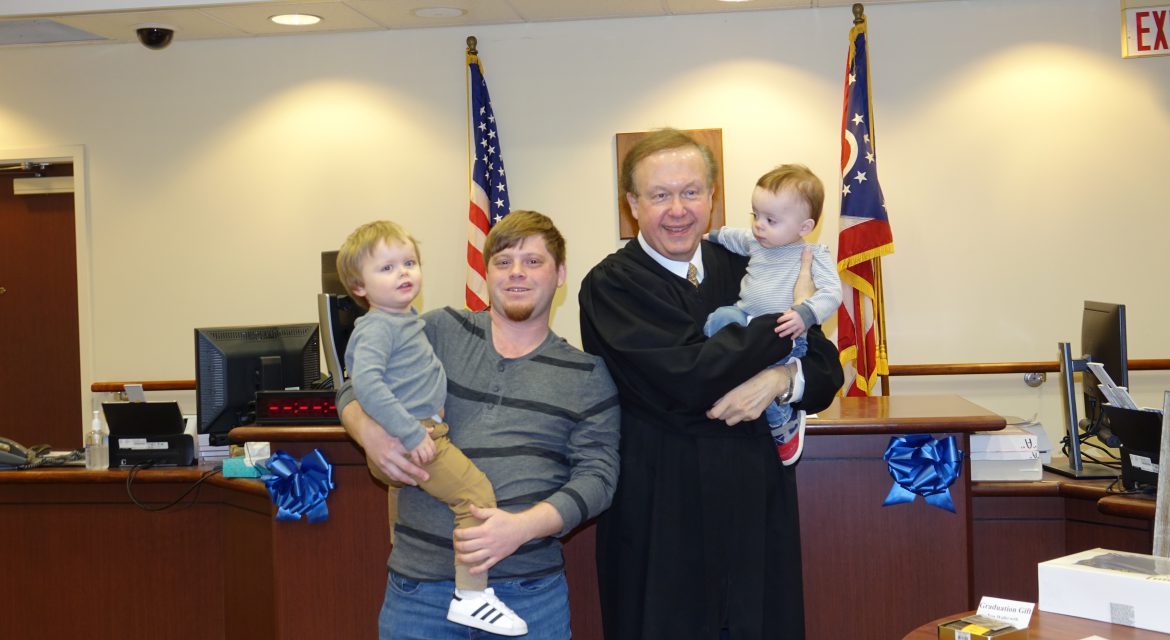
BATAVIA, OH — Jeffrey Gobeille, 28, made a life-changing decision when he chose to enter Clermont County Family Recovery Court in October 2020. On March 17, he fulfilled the requirements to graduate and entered into the 60-to-90-day exit phase of the program.
“It was the best thing for me to get my kids back,” said Gobeille, father of sons River, 2½, and Asher, 1. “Family Recovery Court offered what I needed, the guidance and support.”
Judge James Shriver asked Gobeille if he wanted to start Family Recovery Court during a review hearing on a Child Protective Services case.
“Judge Shriver had presented this to me a couple of months before, so I had time to think about it and said, yes, this was something I had to do,” Gobeille said.
The specialized docket under Judge Shriver was one of the first of its kind in southwestern Ohio when it started on Nov. 13, 2014. Clermont County Family Recovery Court was based on the drug court model, which emphasizes treatment over punishment.
On average, the program takes more than a year to complete. Families (couples or individuals) voluntarily enter Family Recovery Court. Requirements include attending frequent court hearings, Substance Use Disorder treatment, random and frequent drug screens, meetings with a case manager, calling and checking in regularly, attending AA or similar sober support meetings and getting a sponsor or mentor, having income, establishing housing, taking care of criminal matters and getting a driver’s license.
Gobeille recalls Angie Livesay, then the court’s administrator, explaining the program to him.
“It was like a blur,” he said. “It seemed overwhelming.”
Gobeille was required to check in with the court daily, do drug screenings two to three times per week, write a book report and provide written updates about sober support meetings. He participated in an outpatient treatment program at BrightView in Batavia, graduating at the start of 2022.
“In the beginning, Jeffrey was very quiet and reserved, but with each review hearing he opened up just a little bit each time,” Judge Shriver said. “Now he talks all the time and shares the ups and downs of parenting and what he has learned from his sober support meetings.”
Judge Shriver added: “Jeffrey is engaging and offers feedback and support to others in the program. Jeffrey enjoys the fellowship of this sober support meetings and lives his life by the principals in the Alcoholics Anonymous Big Book. Jeffrey’s commitment to recovery was strengthened even more when he reunified with his two children, River and Asher.”
Gobeille said his recovery program strengthened when he began attending recovery meetings in person, instead of online, in May of last year. He got a sponsor, formed sober friendships, and worked on his spirituality.
“I got the willingness to do what they suggested,” Goveille said. He’s been sober since May 29, 2021.
Gobeille gained custody of River and Asher in November 2021. He and the children live with his parents, who provide day care while he works as a medical service technician. He said parenting education from CPS and Child Focus has helped improve his parenting skills.
“I think River and Asher are better than ever and I’m doing really well,” he said. “I don’t want to sit here and be complacent. I want to continue to be better.”
Judge Shriver said: “Jeffrey has grown as a person, as a father, and as a person in recovery.”
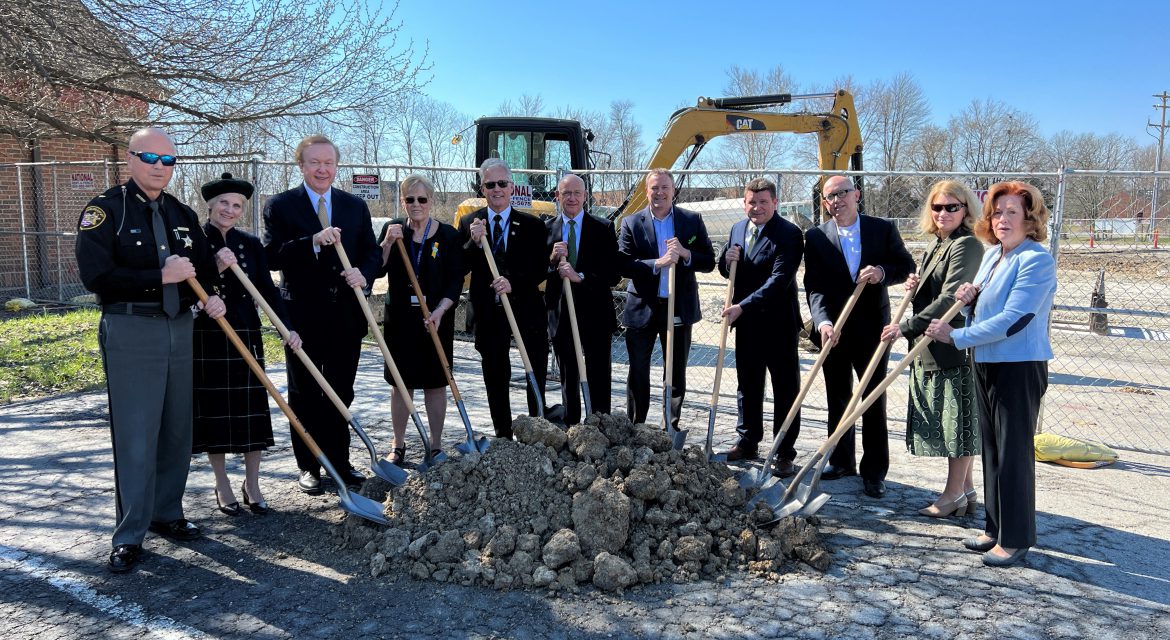
BATAVIA, OH — Clermont County officials today participated in a ceremonial groundbreaking for the 29,000-square-foot expansion and renovation of Juvenile Court. The facility off Bauer Road in Batavia will allow the Court to combine staff and services from five buildings into one location
The project consists of five courtrooms, administrative offices, holding cells and high density filing rooms for the Courts as well as individual offices for Juvenile Probation along with conference rooms and group activity rooms.
Mark Spaulding Construction Company of Florence, Ky., bid for $7.5 million for the base project, with a grand total of $8 million that includes proposed alternates.
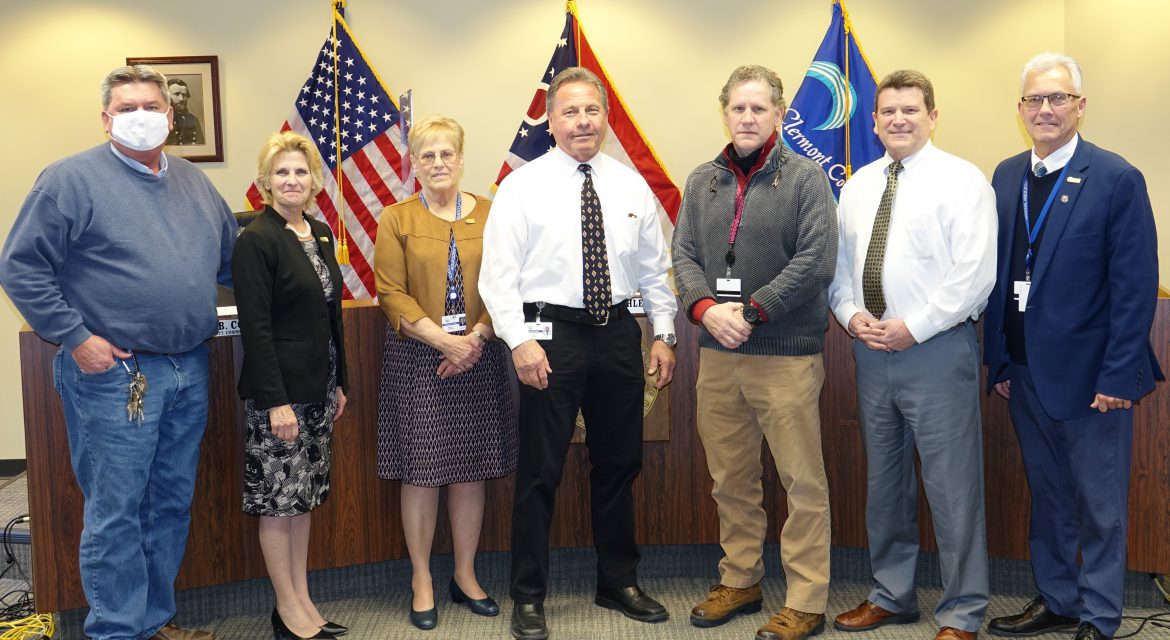
BATAVIA, OH – The Board of County Commissioners have awarded the bid for a 29,000-square-foot expansion and renovation of Juvenile Court to Mark Spaulding Construction Company of Florence, Ky. The bid was for $7.5 million for the base project, with a grand total of $8 million that includes proposed alternates.
The project will consist of five courtrooms, administrative offices, holding cells and high density filing rooms for the Courts as well as individual offices for Juvenile Probation along with conference rooms and group activity rooms.
“The expansion of the Juvenile Court facility allows the Court to combine staff and services from five buildings into one location,” Judge James Shriver said. “I extend my deepest thanks to the Board of County Commissioners for embracing the difficult operational challenges encountered by the Court. The expansion of the facility will allow greater flexibility to provide for the care, protection and development of children and address the multiple issues presented to this Court on a daily basis.”
Bonnie Batchler, President, Board of County Commissioners, said: “We’re grateful for the opportunity to support those who work so hard each day to work with the youth of our community. This expansion and renovation will help them more efficiently go about their important work.”
David Painter, Vice President, Board of County Commissioners, said: “Clermont County is committed to providing the best facility for those who devote so much time and energy to helping families and children. We’re excited for the courts to move into an upgraded work environment.”
Commissioner Claire Corcoran said: “This expansion and renovation will help bolster Clermont County’s work with the juvenile population. We’re appreciative of the great work of the courts and probation and want to provide them with a top-quality facility.”
Mark Spaulding Construction has been given the notice to proceed as of Feb. 27, 2022, on the project designed to bring Juvenile Court, Juvenile Probation and Probate Court under one roof. County capital funds will pay for the project off Bauer Road, on Clermont Center Drive, in Batavia.
MSA Architects is serving as architect.
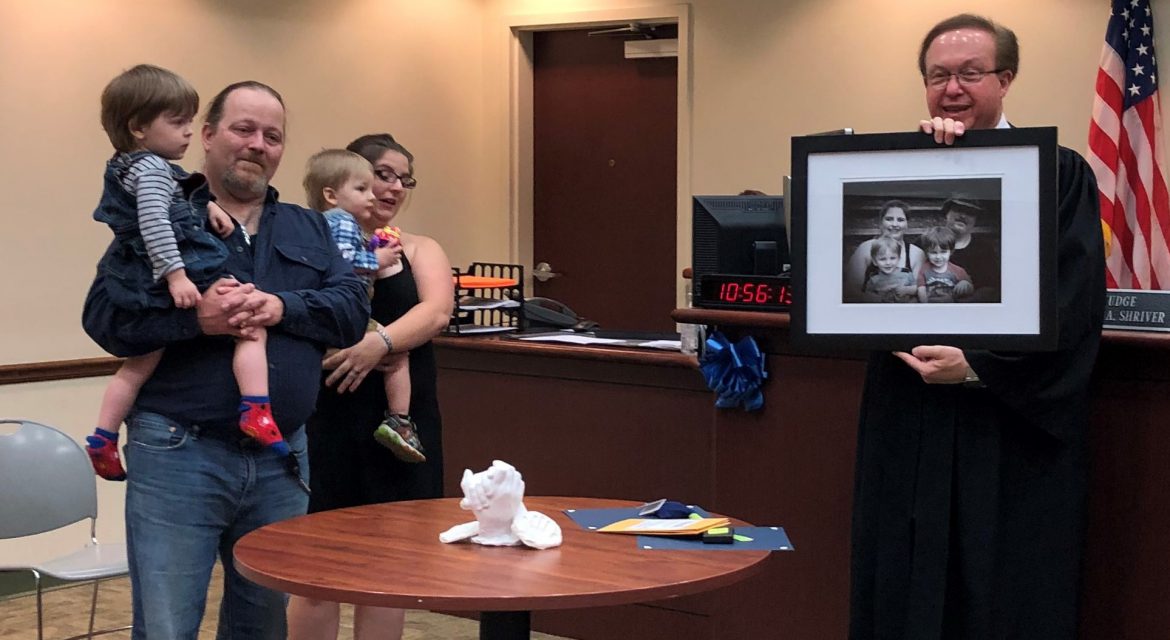
BATAVIA, OH — Sarah Duschl and Richard Wirmel admit to feeling a bit nervous when they entered Clermont County Family Recovery Court on Aug. 10, 2020.
“We were scared because we knew that this program was intense,” said Sarah during a graduation ceremony a year and nine days later. She and Richard held their boys, Jacob, 2, and Tyler 1.
Judge James A. Shriver said Sarah and Richard worked hard to build a stable home.
“Sarah maintained employment with the same employer and has advanced in her position at work,” Judge Shriver said. “Richard is a proud stay-at-home father and has shown patience and offers support to others in need. Richard and Sarah have dealt with many challenges and personal struggles during their journey, but through determination and the support for each other they are now living as a family in recovery.”
The specialized docket under Judge Shriver was one of the first of its kind in southwestern Ohio when it started in 2014. Family Recovery Court was based on the drug court model, which emphasizes treatment over punishment.
On average, the program takes more than a year to complete. Families (couples or individuals) voluntarily enter Family Recovery Court.
Requirements include attending frequent court hearings, Substance Use Disorder treatment, random and frequent drug screens, meetings with a case manager, calling and checking in regularly, attending AA or similar sober support meetings and getting a sponsor or mentor, having income, establishing housing, taking care of criminal matters and getting a driver’s license.
“Sometimes it feels like you are drowning, but you are not,” Sarah said. “You are succeeding.”
Sarah and Richard got their children back from protective care more than eight months ago. They both have more than a year of sobriety. Sarah got her driver’s license back and Richard is working to do the same.
“You have done exceptionally well, despite all of the obstacles,” said Judge Shriver, before giving graduation gifts such as certificates of outstanding achievement, gift cards to Wal-Mart and Chick-Fil-A, a notebook with progress reports, and a framed family photo.
“We’re in the business of putting families back together,” he said, after showing the framed photo to the happy family.
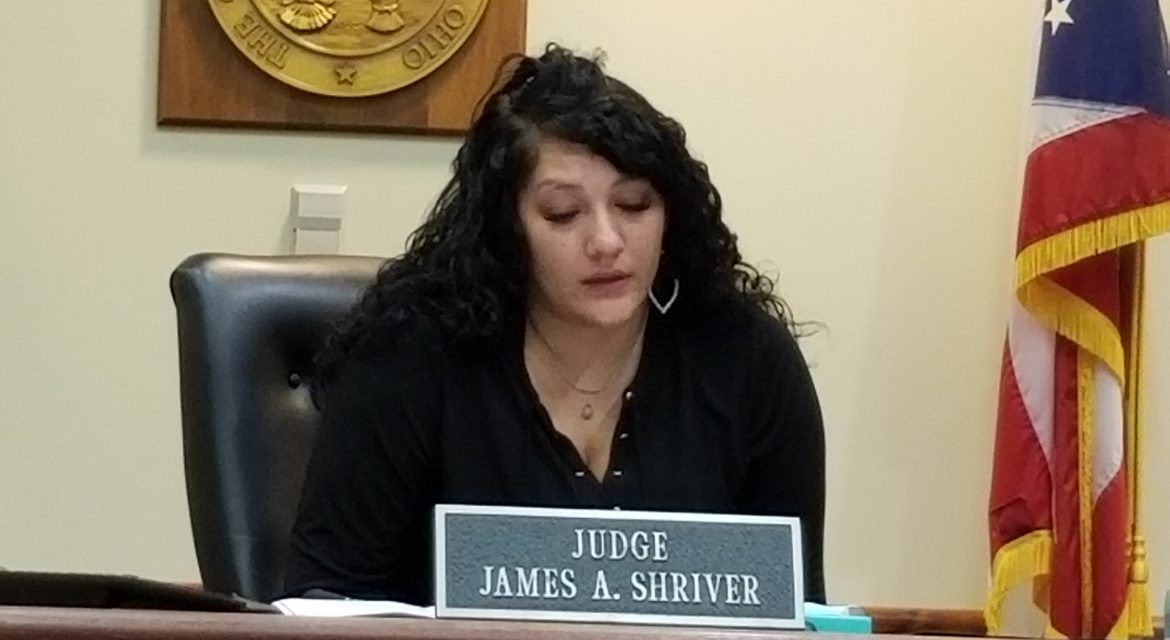
BATAVIA, OH — Lexus McCoy didn’t let the pandemic stop her from starting recovery from addiction. McCoy, 22, began the rigorous Clermont County Family Recovery Court just before COVID-19 hit. Much of her support came over Zoom, instead of in person.
“You have a great work ethic,” said Judge James A. Shriver, during the court’s 11th graduation ceremony on April 15.
McCoy joined the program in February 2020. She has been employed throughout the process and is pursuing her GED. Since joining the Family Recovery Court, she has been successfully released from probation. She is active in the sober support community and is working with a sober support sponsor. She has had her 5-year-old son back in her care since December 2020.
Her commencement project covered Parenting in Recovery. She spoke about handling the challenges of raising a small son – and the helpful advice she received from family members, her boyfriend, a counselor, her recovery coach, caseworkers, Family Recovery Court staff, and her Narcotics Anonymous (NA) family and sponsor.
“Don’t be afraid to reach out for help,” she said.
Family Recovery Court, a specialized docket under Judge Shriver, was one of the first of its kind in southwestern Ohio when it started in 2014. The program is based on the drug court model, which emphasizes treatment over punishment.
On average, the program takes more than a year to complete. Families (couples or individuals) voluntarily enter Family Recovery Court.
Requirements include attending frequent court hearings, Substance Use Disorder treatment, random and frequent drug screens, meetings with a case manager, calling and checking in regularly, attending AA or similar sober support meetings and getting a sponsor or mentor, having income, establishing housing, taking care of criminal matters and getting a driver’s license.
Participants work closely with a recovery coach, who helps them get started attending 12-step or similar meetings and makes herself available to talk.
Judge Shriver presented McCoy with a certificate for 400 days of sobriety, a diploma and gifts such as a notebook charting her progress.
“You persevered and you knew what you wanted,” Judge Shriver told McCoy.
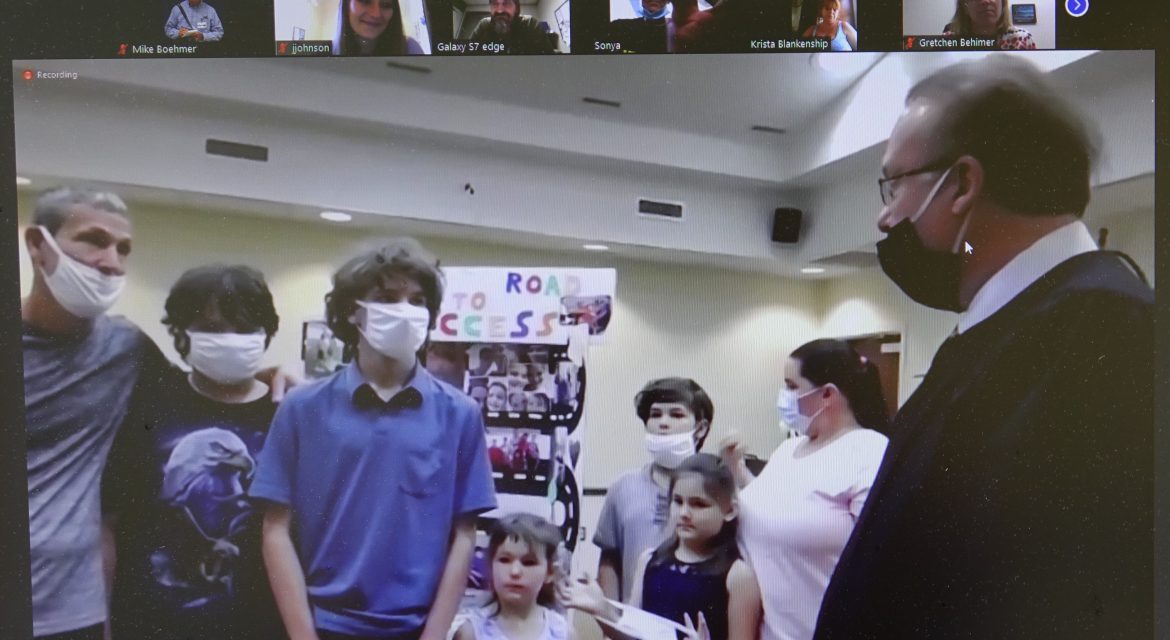
BATAVIA, OH (June 12, 2020) — Robert Schubert and wife Christina Northern – the parents of six children, ages 15 to 20 months – had lived in a van in back of a Clermont County sandwich shop for 18 months when they came to Family Recovery Court. He signed up for the rigorous year-long program on Aug. 21, 2018, and she joined about a month later.
Addiction to methamphetamine knocked them down to the point that their children were placed in foster care on Oct. 17, 2017.
Thanks to the structure and support of Family Recovery Court (a part of Clermont County Juvenile Court), they regained custody of their children on Sept. 27, 2019. Robert has been sober since Aug. 15, 2018, and Christina, June 17, 2018.
On June 11, the six children joined their parents at a virtual/in-person graduation ceremony at the court. Thomas, 15, Landen, 13, Ethan, 10, Zelia, 8, Hailey, 5, and Lily, 20 months, watched as Judge James A. Shriver praised the family, wearing masks due to COVID-19. Family members and case workers watched online via Zoom.
“We had a chance to graduate virtually earlier, but we waited for the extra time to thank him face-to-face,” Robert said.
The specialized docket under Judge Shriver was one of the first of its kind in southwestern Ohio when it started on Nov. 13, 2014. Clermont County Family Recovery Court was based on the drug court model, which emphasizes treatment over punishment.
On average, the program takes more than a year to complete. Families (couples or individuals) voluntarily enter Family Recovery Court.
Requirements include attending frequent court hearings, Substance Use Disorder treatment, random and frequent drug screens, meetings with a case manager, calling and checking in regularly, attending AA or similar sober support meetings and getting a sponsor or mentor, having income, establishing housing, taking care of criminal matters and getting a driver’s license.
“Even though it was tough, I liked the program and its structure a lot,” Robert said.
Robert and Christina did six months of parenting classes, anger management training and marriage counseling. They participated in regular drug screening, completed outpatient treatment at Clermont Recovery Center, and attended recovery meetings – while holding down jobs.
“It was definitely a challenge,” Robert said. “They kept us going. When you stop using drugs, you’re starting a new life.”
The couple also needed to find a residence, a difficult task due to an eviction and two prior drug convictions.
A case manager helped the family find a 2-bedroom apartment – their home for almost two years. The program helped with the first month of rent, deposit and gas cards. Three boys are in one bedroom, three girls in another, and the parents have a bed in the living room.
They kept the kids in school in Fayetteville, about 45 minutes away, because they’re doing so well there. All have earned “student of the week” or “student of the month” awards since returning to their care.
“It hasn’t been easy, but we’re probably better off now than we have ever been,” Robert said. “All of our bills are paid. We’re maintaining a home. We’re building a nest egg to get a home closer to the school.”
“When they came to Family Recovery Court, they were homeless. They have an extensive history of drug use including a variety of substances,” Judge Shriver said. “They have both maintained employment, secured housing, regained custody of their children, completed treatment requirements and are both celebrating more than 18 months of sobriety. They have complied with all other program requirements and Recovery Court officials are so proud of their progress. Since their children have returned to their home, they have shared photos with the court of celebrating holidays and spending time in nature, which they love to do.”
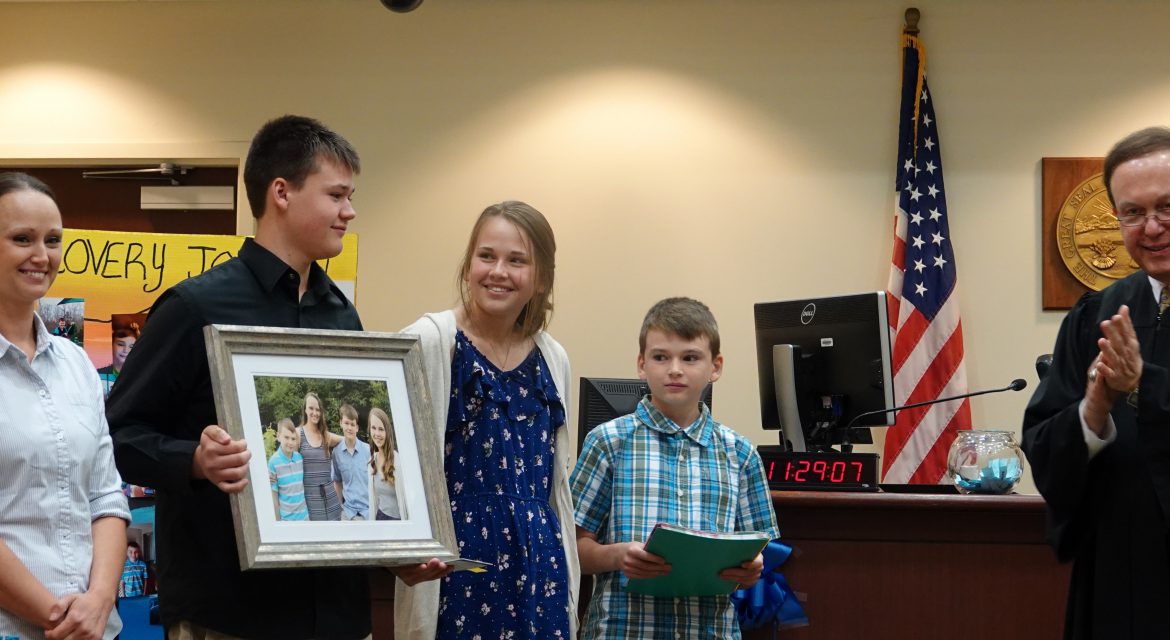
BATAVIA, OH (Dec. 20, 2019) — The Family Recovery Court of the Clermont County Juvenile Court has earned final certification from the Ohio Supreme Court’s Commission on Specialized Dockets.
In order to receive the certification, the local court had to submit an application, undergo a site visit, and provide specific program materials in response to certification standards that went in to effect in January 2014.
Ohio Supreme Court Chief Justice Maureen O’Connor congratulated the Family Recovery Court and Judge James. A. Shriver for receiving final certification.
“Specialized dockets divert offenders toward criminal justice initiatives that employ tools and tailored services to treat and rehabilitate the offender so they can become productive members of society,” O’Connor said. “Studies have shown this approach works by reducing recidivism while saving tax dollars.”
Specialized dockets are courts that are dedicated to specific types of offenses or offenders and use a combination of different techniques for holding offenders accountable while also addressing the underlying causes of their behavior. There are more than 240 specialized dockets in Ohio courts that deal with issues such as:
The standards provide a minimum level of uniform practices for specialized dockets throughout Ohio, and allow local courts to innovate and tailor to meet their community’s needs and resources.
Judge Shriver said, “Clermont Family Recovery Court is making a tremendous positive impact in the lives of parents and children. Comments I have received from participants in the past include:
‘This program changed my life and helped me get my family/life back on track and without the help and support of the program and everyone involved, I wouldn’t be where I am today.
‘Thank you Judge for giving us the opportunity to shine in positive ways. Thank you for this program.”’
The certification requirements include establishing eligibility requirements, evaluating effectiveness of the specialized docket, and assembling a treatment team for implementing daily operations of the specialized docket. The team can include licensed treatment providers, law enforcement, court personnel, and is headed by the specialized docket judge.
The Commission on Specialized Dockets has 22 members who advise the Supreme Court and its staff regarding the promotion of statewide rules and uniform standards concerning specialized dockets in Ohio courts; the development and delivery of specialized docket services to Ohio courts; and the creation of training programs for judges and court personnel. The commission makes all decisions regarding final certification.